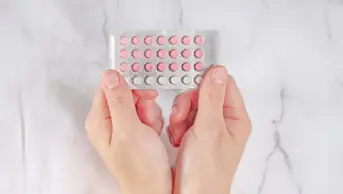
Shutterstock.com
The number of hormone replacement therapy (HRT) prescriptions dispensed has increased by 370% in the past ten years, NHS Business Services Authority (BSA) data have shown.
Data published by NHSBSA on 23 October 2025 revealed that, in 2024/2025, 14.7 million HRT prescription items were dispensed compared with 3.1 million items in 2015/2016.
In 2024/2025, the number of HRT items dispensed has increased by 11% — up from 13.3 million items in 2022/2023 — while the number of patients increased by 200,000 from 2.6 million in 2023/2024, according to the data.
The number of patients who receive these items has almost tripled, from one million patients in 2015/2016 to 2.8 million in 2024/2025.
On the same day that the data was published, the government announced that dedicated menopause questions will be added to the NHS Health Check assessment.
The questions are to be developed over the coming months, with health experts feeding in, and will benefit “nearly 5 million women”, the statement said.
The NHS Health Check is aimed at identifying people with health risks such as cardiovascular disease, stroke, kidney disease, type 2 diabetes mellitus and dementia. They are offered to eligible patients aged 40–74 years every 5 years and can be conducted by a range of healthcare professionals, including pharmacists.
Nuttan Tanna, pharmacist consultant in women’s health and osteoporosis/bone health at London North West University Healthcare NHS Trust, said: “With the availability of the HRT prepayment certificate since 2024, and now the addition of dedicated questions to the NHS Health Check about the menopause … this is very positive when we think of offering improved patient care within the NHS and a good step forward for women’s healthcare.
“An increase in social media attention over the last two to three years has helped drive an increase in awareness of the menopause phase and explains the increase in HRT prescribing noted.
“We now need to ensure competency in menopause management and HRT prescribing within primary care — GPs, nurses and pharmacists — for cost-effective use of NHS funding and resources. Focus should be on evidence-based prescribing and identification of evidence gaps.”
Sue Mann, national clinical director in women’s health at NHS England, commented: “Far too often we still hear women say their concerns aren’t listened to or that they aren’t getting enough support for the debilitating symptoms that can come with the menopause, many of which can have a big impact on their lives and can be invisible to others.
“By tailoring the NHS Health Check to include questions around menopause, we hope more women will get the support they need to manage their symptoms — and this is testament to our ongoing commitment to improving treatment, care and quality of life for women.”
The increase in menopause prescribing in recent years has, in part, been attributed to the airing of UK TV personality Davina McCall’s documentaries about the menopause in 2021, which is believed to have led to an increase in the number of women presenting to their GP for treatment for the management of menopausal symptoms.


